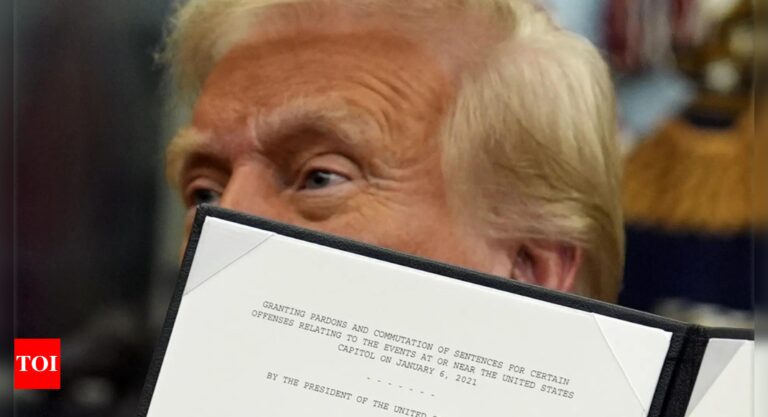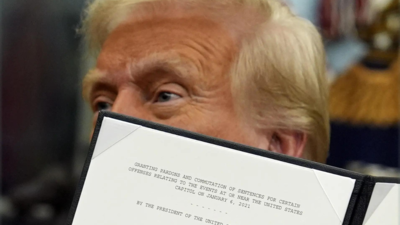Republican senators said just hours after taking office Monday that Donald Trump would commute and pardon hundreds of January 6 protesters, including some who have been charged and convicted of crimes against police officers. -Struggled to defend President Trump’s decision.
The move put Republicans in the awkward position of having to either defy Trump or defend the release of prisoners who attacked the very police officers protecting the Capitol.
Sen. Thom Tillis (R-North Carolina), who previously warned against granting full pardons to the rioters, said he “totally disagrees” with President Trump’s decision, adding, “There are legitimate issues surrounding the security of the Capitol. “causes,” he added. CNN reported that Senate Minority Leader John Thune, a Democrat, sidestepped a question about pardons by saying, “We’re looking to the future, not the past.”
Sen. James Lankford (R-Okla.) said he was still working out the “details” of pardons and commutations, but called attacks on police officers a “very serious problem” that should be punished. emphasized. “I think we need to continue to say we’re the party of law and order,” Lankford said.
Republican Sens. Lisa Murkowski (R-Alaska) and Bill Cassidy (R-Louisiana), who voted to convict President Trump after his second impeachment trial in 2021, also opposed his decision. Murkowski expressed concern about the message the pardon would send to Capitol Police officers who protect members of Congress every day, but Cassidy said, “I’m a big ‘back the blue’ guy. Police. People who assault public officials think so, if that’s what they want.” If you’re going to commit a crime, you should be on time. ”
Asked Tuesday if he believed assaulting police officers would never be tolerated, President Trump said, “Of course.” Asked about the specific case of the man who was pardoned for putting a stun gun into the neck of a police officer, Trump said he didn’t know, but “we’ll look into everything.” He also claimed to be “a friend of the police more than any president who has ever held this office.”
Even Vice President J.D. Vance said days before his inauguration that those who committed violence on January 6th “obviously” should not be pardoned. Asked why Vance’s claims are wrong, Trump said, “There’s only one reason: They’ve served years in prison. They shouldn’t have served — excuse me. — and they’ve served years in prison. …These people actually love our country, so we thought a pardon was appropriate.”
Most Republicans would not weigh in on whether Trump made the right decision, arguing that it was the president’s prerogative, not Congress’s, to grant pardons. Sen. John Cornyn (R-Texas) and House Speaker Mike Johnson (R-La.) echoed that sentiment, with Johnson saying, “That’s not my position. It’s the president’s sole decision. The president has made a decision, so I support him.” On top of that. ”
Sen. Markwayne Mullin (R-Okla.), when asked repeatedly about amnesty for individuals who attacked police officers, agreed there was “no question” that January 6 was a “riot.” However, the main focus of the discussion shifted to Biden’s pardons. “I have my personal feelings on this, but the American people have chosen to move forward, and President Trump, it is the prerogative of the president to do this. … I understand that, but it’s a problem.” It remains the prerogative of the president, just as it was Joe Biden’s prerogative. ”
When asked about his reaction to the pardon, Sen. Steve Daines (R-Mont.) would simply say, “I’m grateful that President Trump is the president of the United States.”
The controversy centers on President Trump’s decision on his first day in office to grant clemency to more than 1,500 participants in the January 6 Capitol attack, including leaders of the Proud Boys and Oath Keepers organizations. is. Presidential pardons target individuals convicted of serious crimes despite documented evidence of resistance or aggressive encounters.
The immediate and subsequent siege, which lasted seven hours, left more than 140 law enforcement personnel injured and four Trump supporters and five police officers killed. The ensuing investigation by the FBI and Department of Justice became the most extensive criminal investigation in U.S. history, indicting more than 1,580 people and successfully obtaining approximately 1,270 guilty verdicts.



